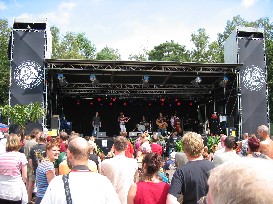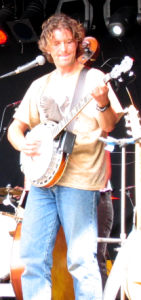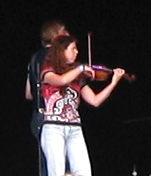Traditional music from the Netherlands Part VIII:
We nun Henk
one of the new keepers of Dutch traditional
music
In this serie about traditional music in the Netherlands this time not a band from the past but a young and fresh group of musicians. Not many young people in Holland start a band to play the old songs and tunes of the lowlands. We nun Henk (could be translated as 'what a dummy' in the dialect of the city Tilburg) is the big exception and with their latest cd RUM, on which they play songs and tunes once made famous by the Belgian band RUM, they convinced people internationaly that they are one of the new keepers of the Dutch traditional music. For this edition I interviewed Hans Hoosemans, one of the string guys of the band. He explains how he started to get interested in the traditional music, how the band was started and he presents his vision to Dutch traditional music.
Hans wasn't always interested in folkmusic. He played in several bands but not folkmusic at all. How did he get interested in traditional music?
 Hans:
'I started as a bass player in a local friends' group. We mainly played covers
of psychedelic sixties bands like The Velvet Underground and The Leaves. Being
interested in sixties music I came across Fairport Convention and Ry Cooder
(Into the Purple Valley). Then I started to look for Dutch equivalents and
so discovered Rum, Wolverlei, Dommelvolk and RK Veulpoepers BV. I did so back
in 1995, when there was absolutely nothing in the way of Dutch traditional
music. That is why it seemed fun to me to start things up, against all odds.'
Hans:
'I started as a bass player in a local friends' group. We mainly played covers
of psychedelic sixties bands like The Velvet Underground and The Leaves. Being
interested in sixties music I came across Fairport Convention and Ry Cooder
(Into the Purple Valley). Then I started to look for Dutch equivalents and
so discovered Rum, Wolverlei, Dommelvolk and RK Veulpoepers BV. I did so back
in 1995, when there was absolutely nothing in the way of Dutch traditional
music. That is why it seemed fun to me to start things up, against all odds.'
The interest in the Dutch folk was there and he liked the Idea of a band, but how do you find other people who are interested in this old and almost forgotten music?
Hans: 'We used to play yearly at a friends' party. When one day one of us was unable to attend, we got the idea of playing a folkmusic set. If I remember it well, we chiefly played RK Veulpoepers BV 's songs, a seventies band whose members lived in our neighbourhood. We had borrowed their mandolin, not having one ourselves. Actually, all this was meant to be a once-in-a-lifetime performance (hence our weird band name, not based on a serious idea whatsoever) but it caught on well with the audience, so we deciced to go on with it. The name remained with us, also because just after this gig I wanted to keep on going with traditional music in dialect. Later on, this plan of using texts in dialect evaporated.When we started there where five of us (vocals, recorder, violin, guitar, mandolin and drums). Nowadays we have a different singer and fiddler, and another guitar player and double bass player have joined us. So now we are seven. At the time we had to re-invent the wheel. We hardly knew any folk musicians and didn't have our roots there. We based our music on the abovementioned seventies albums. Our first cd appeared when Ambrozijn and Laïs also debuted. To us it was quite a shock: this was what folk music could sound like as well. In fact we had just taken over where the Dutch folkgroups had stopped back in 1982.'
 Now,
after a few cd's the group concured it's own place in Dutch music. Both young
and old seem to enjoy their songs and tunes. But where does the band stand,
what is their place in the Dutch world of music?
Now,
after a few cd's the group concured it's own place in Dutch music. Both young
and old seem to enjoy their songs and tunes. But where does the band stand,
what is their place in the Dutch world of music?
Hans: 'Besides Wè-nun Henk there are not so many people who play Dutch tradional music. A Dutch expression describing our situation is: "In the land of the blind One-Eye is king". Herewith I mean that I do not think that we are an outstanding group, but that there are hardly any competitors. This might be our main virtue. We get a lot of reactions from young people who state they have never seen any of the like before seeing us. Personally, I am a bit proud that we have drawn renewed attention to our illustrious predecessors. We have contributed to the reunion of the RK Veulpoepers BV in 1996. We have played old songs with Gerard van Maasakkers at a time that he prefered not to be reminded of his old work. Last year, we have made a cd as a tribute to the Flemish group Rum. Next year, we will go on tour with Dommelvolk. Our cd "Rum" can be considered as a protest to the fact that Rum's classics have never been put on cd. But wait and see: next month a cd box with old work from Rum will be published.Because of the influence that the first folk revival has had on our music, the latter is sometimes considered to be old-fashioned. Another reason for calling us so is that we focus on songs, while now it is hot, mainly in Flanders, to play instrumental dance music. We are not exactly fashionable. We only use accoustic musical instruments and are not influenced by the the so-called "world music". So Wè-nun Henk is literally a traditional group.'
Now you mention the so called worldmusic, the interest in Dutch traditional music might have been low but somehow the Dutch have a great interest in music from other cultures. What is your theory about this?
Hans' Several theories exists as to why Dutch people lack interest in their own culture. Really, I do not know. By all means, they have never had to fight for preserving their culture as the Flemish, Irish or Basks had to do. This might explain why people do not really value it. I think it is OK that the Dutch have an open mind for other cultures, which might account for avoiding right-wing tendencies like those in other countries. On the other hand, I think an interest for one's own culture and an open mind for others' can exist next to and with each other.'
 I
heared about a compilation cd you are preparing with traditional music, what
about this project?
I
heared about a compilation cd you are preparing with traditional music, what
about this project?
Hans: 'At the moment I am compiling a cd that will be launched at the beginning of 2005. Five new Dutch folk groups are on it, namely Lirio, Dubius, Mus, Matzko en Wè-nun Henk. Contrary to what many people think, quite a lot of folk music is being played in The Netherlands. Too bad they do not work out of their own tradition, but anyway…
Whilst in Flanders the folk scene is well organized, The Netherlands lack such an infrastructure. This is the reason why I like to gather these groups and to draw attention to their music. Strikingly, Belgian Radio 1 will devote a special to this project whilst the Dutch media does not pay any attention to it. I would like to organize a tour for these groups in Dutch clubs. After that I would like to do something with Dutch music together, I mean something to do with Oude Hollandse Boerelieties (Old Dutch Farmers' Songs) and Contredansen from around 1700.'
Hans' Top 10 of important albums for the Dutch Folk music:
As you can read Hans likes to talk about the music and sharing his vision on the matter. So when my final question came, what three recordings would you think are most valuable to Dutch folkmusic, he found that a bit less and only wanted to give me ten of them, not three. So, weak as I am, I present you his top ten. Dont forgot to look under his ten best to see the groups discographie and where to get more info about the band.

